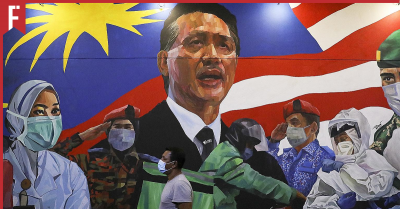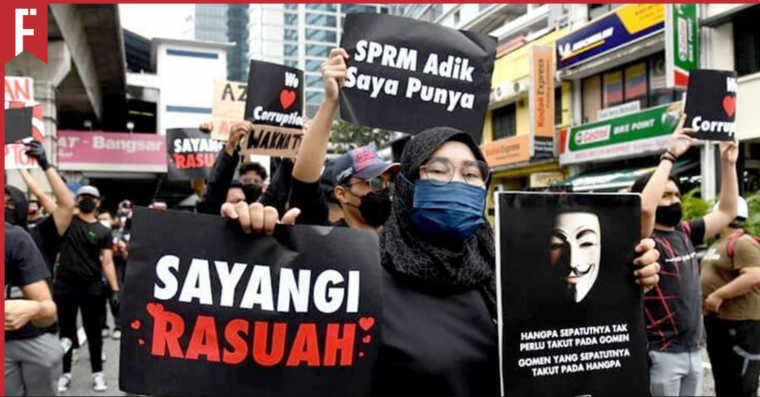
If you visited KL this weekend, you most probably ran into quite an unpleasant surprise. Blocked roads, closed LRT lines and a lot of upset Malaysians.
The reason? The #TangkapAzamBaki rally, a planned protest calling for the arrest of Malaysian Anti-Corruption Commission (MACC) Chief Commissioner Tan Sri Azam Baki for allegations of — ironically enough — corruption.
“Wait, who is this guy?” You might ask. “What did he do?“
Between the flooding disasters, the rising number of COVID-19 cases and the myriad of other scandals and events that hit the headlines over the past few weeks, we wouldn’t blame you for being confused. Heck, we didn’t even realise what was going on until the actual rally took place!
Here’s How It All Began…
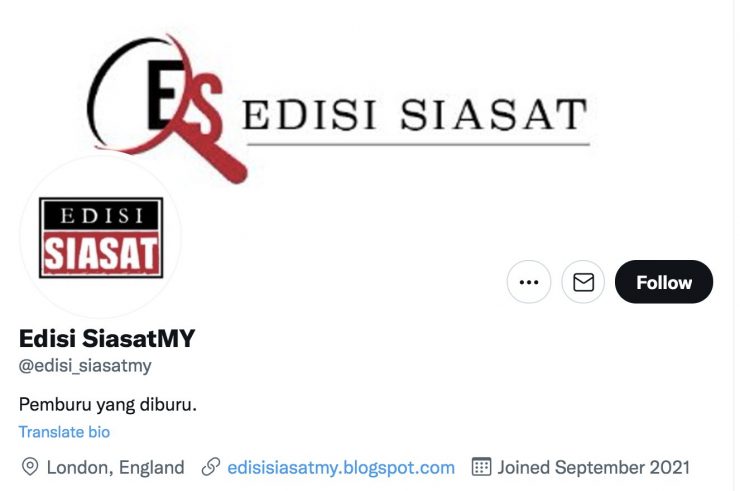
Our sordid tale begins on October 2021, when an anonymously-run Twitter account named Edisi Siasat began to post several allegations involving the MACC and police.
One of its biggest accusations was a claim that Azam had somehow purchased millions of shares in a company back in 2015 — something that should have been pretty much impossible on a normal civil servant’s salary.
26 October 2021: How Deep Does It Go?

Shortly after the Twitter posts, activist Lalitha Kunaratnam wrote an article titled “Business Ties Among MACC Leadership: How Deep Does It Go?” on the Independent News Service (INS) website.
Citing publicly accessible records, she revealed stock trading activities purportedly linked to not only Azam Baki but also his brother, Nasir Baki. Lalitha questioned whether he had declared his millions of shares as required by law.
Under Section 10 of the Public Officers Regulation (Conduct and Discipline) 1993, all public servants must declare both movable properties (money in bank accounts, motor vehicles, jewelleries, firearms, shares, stocks, warrants, bonds and securities) as well as immovable properties (land, landed properties and business ownership/directorship).
8 November 2021: Edisi Siasat Gets into Hot Water
On 8 November 2021, the police opened no less than 13 investigation papers against the owner of Edisi Siasat.
“The news or reports this Twitter handle exposes are mostly made up and for sensationalising the news,” insisted Inspector-General of Police Datuk Seri Acryl Sani Abdullah Sani.
He added that the Twitter user would be investigated under Section 500 of the Penal Code and the Communications and Multimedia Act 1998, which carries a maximum fine of RM50,000 and/or a jail term not exceeding one year.
Edisi Siasat was suspended from Twitter on 28 November 2021.
1 December 2021: Edisi Khas Is Made
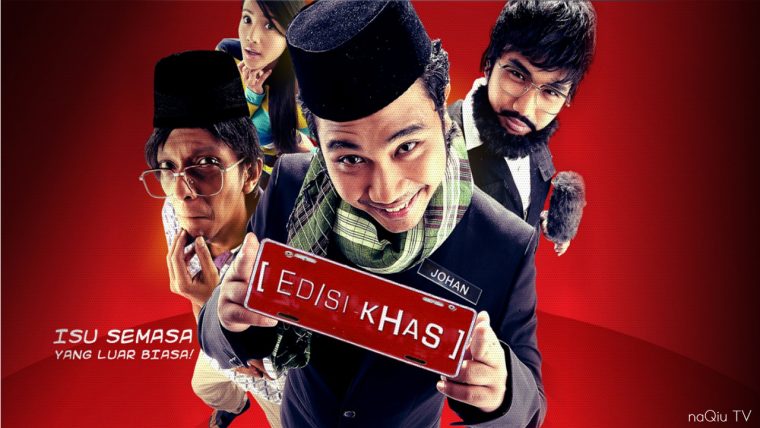
On 1 December 2021, Edisi Siasat reemerged under the new name Edisi Khas.
On 9 December 2021, Edisi Khas posted a shareholding analysis of Gets Global Berhad (formerly known as KBES Berhad) that appeared to show Azam as the owner of over a million shares. His brother, Nasir, owned 3.7 million more. Later on, more documents were posted which appeared to show Azam as the owner of 2.1 million warrants in Excel Force MSC Berhad.
14 December 2021: The News Reaches Dewan Rakyat
On 14 December 2021, PKR MP Sivarasa Rasiah filed an urgent motion to discuss the various accusations against Azam. His motion was rejected by the Speaker.
A month later, Sivarasa’s nephew, Naveen K Rasiah, was summoned to the MACC’s office and charged with a corruption offence — based on an event that happened all the way back in 2017!
27 December 2021: MACC Panel Member Quits
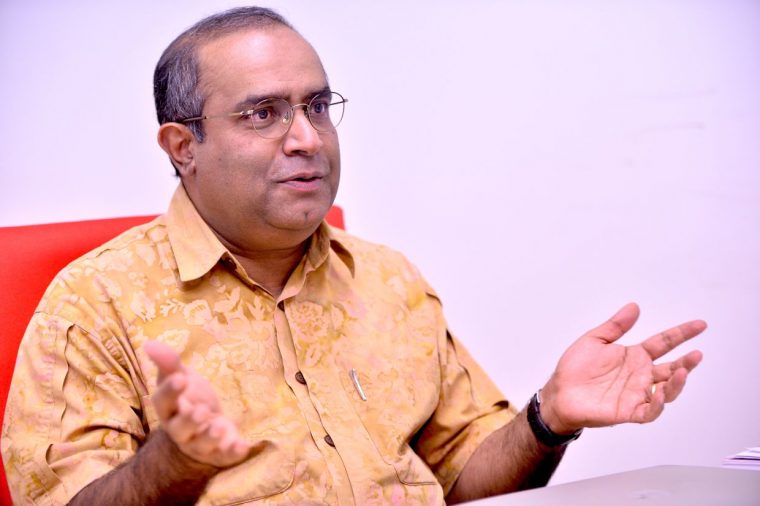
On 27 December 2021, economist Professor Edmund Terence Gomez declared that he was resigning from his position on the MACC Consultation and Corruption Prevention Panel in protest over the panel’s inaction regarding all the allegations surrounding Azam Baki.
“These reports, among other things, raise disturbing questions about the “nexus between business and law enforcement” and a “conflict of interest” situation involving Tan Sri Azam Baki, including if he had declared his extensive ownership of corporate stock as required by law,” Gomez wrote.
Gomez had previously written to MACC’s Consultation and Corruption Prevention Panel Chairman Borhan Dollah and MACC Anti-Corruption Advisory Board (ACAB) Chairman Tan Sri Abu Zahar Nika Ujang in order to discuss this “critical issue of national interest” from as early as November 2021.
In the end, he chose to resign after failing to receive any firm response.
5 January 2022: “My brother was borrowing the account. So you can’t arrest me for it!”
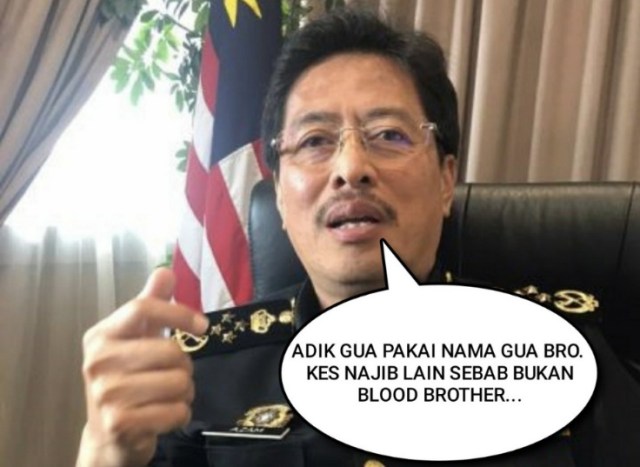
Azam finally released an official response to these allegations at a press conference on 5 January 2022 where he was officially cleared of all wrongdoing by Abu Zahar.
Azam claimed that he had never committed any offences — despite owning all these shares.
“I don’t owe anyone any explanation about what actually happened back in 2015. However, as I’ve explained to the board members, my stock market account, at that time, was used by my brother, Nasir, to purchase shares. After that, in the same year, those shares were transferred to his own stock market account, when he got his own account.
“I don’t see it as an issue to allow my brother to use my account to buy shares. If it is an offence, please tell me it is an offence,” he said.
6 January 2022: SC Investigation Into Azam’s Offense Begins
Interestingly enough, sharing stock accounts is actually against the law. Specifically, under Section 25(4) of the Securities Industry (Central Depositories) Act 1991 (SICDA).
Simply put, this section mandates that a trading account must be opened in the name of the beneficial owner or authorised nominee. This law is meant to prevent market manipulation and insider trading. If anonymous accounts were allowed, anyone with inside information could open multiple accounts to take advantage of it.
Which is probably why the Securities Commission Malaysia (SC) announced that they would be investigating Azam and his brother’s trading history based on his claims.
“The SC will be in touch with the parties involved, including Tan Sri Azam Baki, for an explanation and to verify statements made, as well as gather any relevant evidence,” it said in a statement.
Surprisingly enough, Azam didn’t seem too worried about the SC investigation.
“Regarding the claim that I control many companies, it is a lie spread to destroy my reputation,” he said. “I strongly deny it, and once I have obtained advice from a lawyer, I will take legal action against those who tarnished my reputation.”
Also on 6 January 2022: Azam Sues Lalitha Kunaratnam for RM10 Million
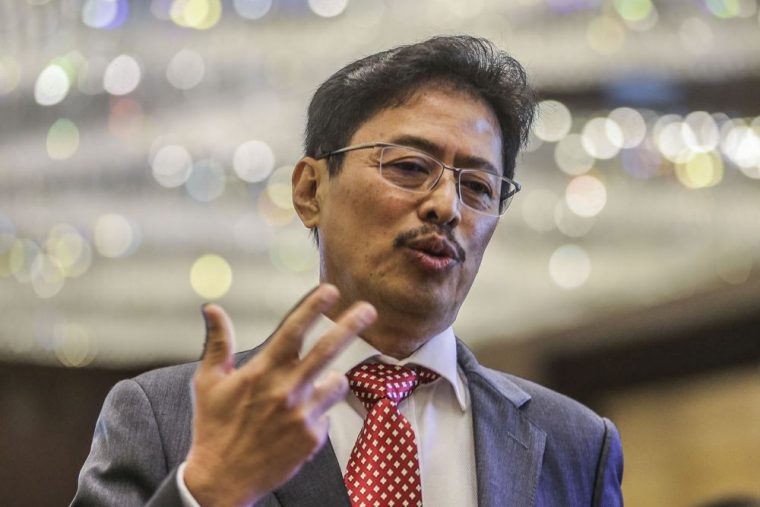
On 6 January 2022, Azam issued a letter of demand against Lalitha Kunaratnam. He ordered her to issue a public apology, delete her articles relating to him and pay RM10 million in damages for “tarnishing his reputation”.
Azam’s move was criticised by not just the press but also various other parties, including MCA Spokesperson Chan Quin Er.
“Lalitha was only doing her job by reporting on public knowledge, as all public-listed companies must publish and submit their annual report, listing their largest shareholders, besides holding annual general meetings,” Chan pointed out.
“This inadvertently portrays the anti-corruption enforcement agency — which he represents — as vindictive and flexing the muscles of government machinery to exert undue pressure to silence anyone on issues of public interest.”
8 January 2022: ACAB Members Say That Zahar Ujang Was NOT Representing Them When Clearing Azam Baki
On 8 January 2022, six members of the Anti-Corruption Advisory Board declared that Abu Zahar’s claims that Azam Baki hadn’t committed any crime was his own personal point of view and not the decision of the board as a whole.
“During his press conference, Abu Zahar said… that the board was satisfied with the explanation given by Azam. He further said there was no crime committed or conflict of interest in the matter.
“We categorically wish to state that the board members at that meeting or at any time thereafter did not express such opinion as Abu Zahar attributed to,” they said.
The six said that they had proposed referring the matter to a different group such as the Parliamentary Special Committee on Corruption or MACC’s Complaints Panel, but were ignored.
“The ACAB has no investigation power as it is established as an Advisory Board,” they said. “We need to provide this clarification in order to safeguard the integrity of the board and the institution.”
12 January 2022: “I will not resign.”

On 12 January 2022, Azam Baki announced that he would not resign his post despite calls for him to quit.
“Only one individual who is most qualified and who can terminate my duties is the Yang di-Pertuan Agong; other than that, I don’t want to bother about whatever demands are championed by any quarters,” he declared during an interview with Sinar Harian.
“One day, at a suitable time, everyone will know the truth.”
The next day, Azam was summoned by the Parliamentary Special Select Committee (PSC) on Agencies under the Prime Minister’s Department to explain his involvement in this stock-trading scandal.
14 January 2022: #TangkapAzamBaki Goes Viral
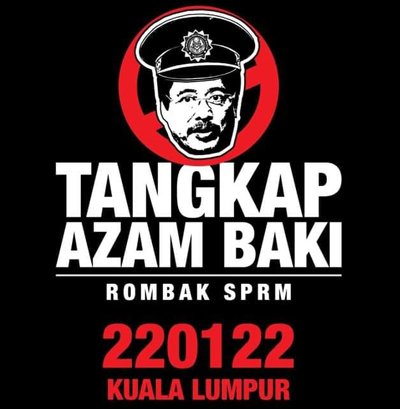
By 14 January 2022, the hashtag #TangkapAzamBaki went viral on social media.
On 18 January 2022, a group calling themselves the “Arrest Azam Baki Action Committee” announced that it would be organising a peaceful street protest on 22 January 2022 in KL. Declaring that Malaysia was already “shrouded in corruption”, the group released a joint statement outlining three demands:
- The arrest of MACC Chief Commissioner Azam Baki.
- For the legal process against Azam to start immediately.
- The restructuring of the MACC, which should then be placed under the purview of Parliament.
“The Arrest Azam Baki Action Committee will head to the streets to protest peacefully, to state the demands of the rakyat for the government to fulfill. We call on all Malaysians to join us,” they said, adding those who could not attend physically could fly a black flag and use the hashtags #TangkapAzamBaki and #RombakSPRM.
18 January 2022: SC Investigation Declares That Evidence Is “Inconclusive”
On 18 January 2022, the SC investigation declared that despite Azam’s earlier confession, it was unable to conclusively establish that a breach under Section 25(4) SICDA had occurred.
“Alhamdulilah, I am thankful for the decision by the Security Commission that has found I have not committed any offence,” said Azam, who added that he would continue to uphold his responsibility as the head of MACC to fight corruption throughout Malaysia.
However, many other parties were less than pleased with the SC’s decision. Former MACC panel member Professor Gomez, who declared that the SC’s findings were “shocking” and “unacceptable”. He urged Putrajaya to set up an independent committee to look into the situation instead of simply letting the matter rest.
“The SC’s unstated reason as to why it was unable to conclusively determine the validity of the allegations against Azam raises a very disturbing question: why is it that all attempts to institute an investigation into these allegations have not resulted in an in-depth and open enquiry?” he asked.
“Given the SC’s inability to provide an informed view of the allegations against Azam, what is now required is for the government to immediately establish an independent committee to review this matter.”
20 January 2022: Independent Committees? New Investigations? Our PM Says “No”
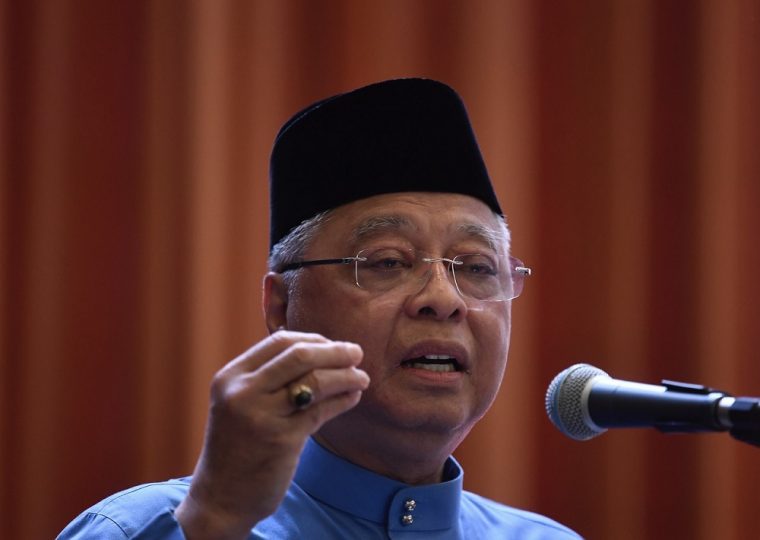
“SC has made a decision and it says there is no case against him (Azam), so we accept the SC’s decision,” said Prime Minister Datuk Seri Ismail Sabri Yaakob to reporters on 20 January 2022.
Ismail Sabri went on to explain that everyone needed to accept the outcome and stop asking for further investigations just because they were “not satisfied”.
“Let’s not think of following our own wishes. If they are the Opposition, surely they want to follow their own wish… that can’t be. They must accept the decision of the professional bodies, such as the SC. So, if there are any queries about the SC’s decision, go and ask the SC,” he said.
On the same day, local activist Adam Adli Abdul Halim was called to the Dang Wangi District Police Headquarters (IPD) to record his statement over the #TangkapAzamBaki rally.
“Adam was asked to record his statement on the holding of the rally and is being investigated under Section 502 of the Penal Code and Section 233 of the Communications and Multimedia Act 1998,” said Dang Wangi Police Chief ACP Noor Dellhan Yahaya.
21 January 2022: Police Block Off KL
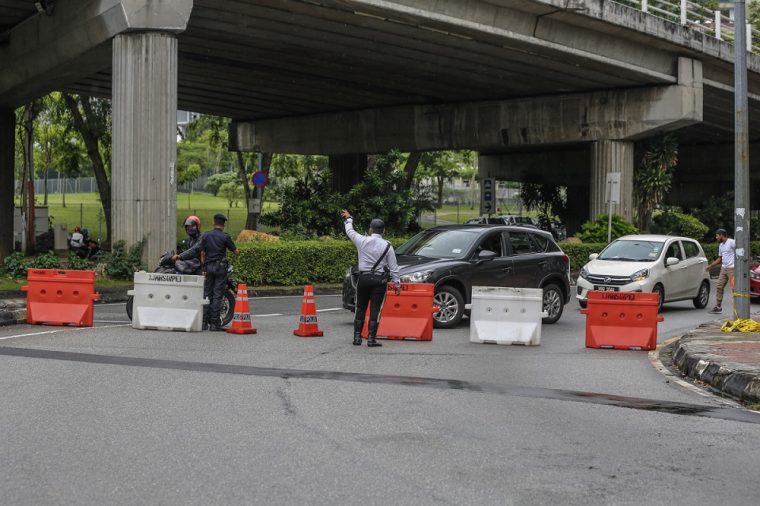
On 21 January 2022, the police announced that they would be diverting traffic from six major roads in KL during the #TangkapAzamBaki rally.
“To ensure public safety and public order, including from risk of being infected with COVID-19, police will be conducting several enforcement actions,” said Dang Wangi Police Chief ACP Noor Dellhan Yahaya, adding that all the train stations connecting to the planned gathering areas would be closed.
However, when the rally organisers announced LRT Bangsar as the new rally location, the police immediately declared that they would be rerouting roads around Brickfields.
This assembly clearly violates the laws in force, namely Regulation 9 (Prohibition of Marching) and Regulation 10 (Control of Assembly), Regulations ― Prevention and Control of Infectious Diseases (Measures in Local Areas of Infection) (National Rehabilitation Plan) 2021,” said Brickfields District Police Chief ACP Amihizam Abdul Shukor.
The police’s behaviour was criticised by former Bersih 2.0 Chairman Maria Chin Abdullah, who urged the authorities to allow the rally to proceed peacefully.
“If it is the COVID-19 that the authorities are afraid of, then they could help facilitate the protest as that’s their role and not be the stumbling blocks,” said Maria. “Don’t have knee jerk reactions to peaceful initiatives.”
22 January 2022: The #TangkapAzamBaki Rally Proceeds
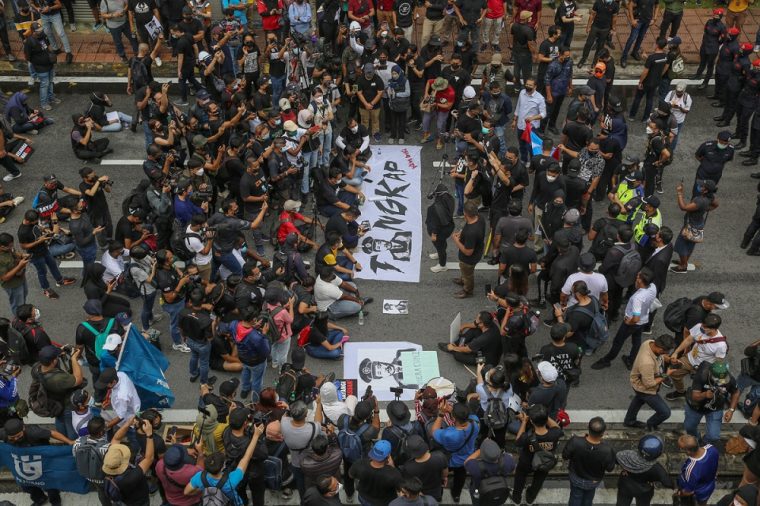
Despite warnings from the police, the #TangkapAzamBaki rally proceeded as planned on 22 January 2022.
Protesters began gathering around 11am. However, according to the organisers, the original plan of holding a demonstration in the city centre had to be changed due to the police’s actions.
“If the roads were not blocked to this extent, we may have still moved further,” said an organiser who requested anonymity. “But the authorities had already blocked all access that we could think of, there is no way out from this area, so there is no point going forward.”
In the end, the protest organisers managed to negotiate for a short walk from the Bangsar LRT up to the intersection to Brickfields. When the police refused to allow them to move further, the protesters resorted to a 15 minute sit-down on Jalan Bangsar.
The protest eventually came to an end, with the crowd dispersing around 12.45pm. Although they had not gone as far as planned, the protesters maintained that the gathering was something that had to be done.
“If he (Azam) did do something against the law, he should be investigated,” said a spectator who requested anonymity. “Just like the other politicians who have many ongoing court cases (like Datuk Seri Najib Razak), we must not let these people go.”
So What’s Happened Since?
Just because the #TangkapAzamBaki rally is over doesn’t mean that everything’s done.
Immediately after the rally, the police began calling up the rally organisers and activists for questioning. According to Brickfields District Police Chief ACP Amihizam Abdul Shukor, up to 94 participants and activists as well as 12 public visitors had been identified, though no arrests had been made as of yet.
“Testimony from witnesses was made in accordance with Section 112 of the Criminal Procedure Code after instructions were obtained from the Kuala Lumpur Deputy Public Prosecutor.
“Pictures of the scene, pictures of activists giving speeches and videos during the rally were also recorded,” he said, adding that the police would be investigating this case under Section 505 (b) of the Penal Code, Section 9 (5) of the Peaceful Assembly Act 2012 and regulations under the Prevention and Control of Infectious Diseases Act 1988.
Could There Be More Rallies In the Future?
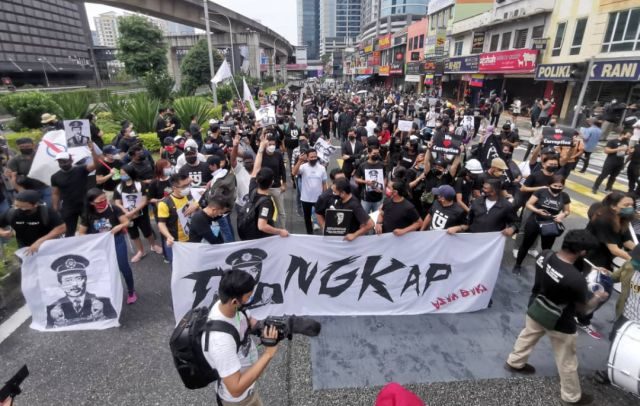
As far as the rally organisers are concerned? Yes.
In the end, the #TangkapAzamBaki rally attracted less than 500 protesters. To put things in comparison, the BERSIH 4 rally in 2015 involved around 250,000 participants on the first day alone!
Yet despite the smaller number of participants, spokesman Farhan Amran maintained that they were still “very happy” with the turnout.
“Today is just the start,” he said in an interview with Free Malaysia Today. “If let’s say the government and agencies are not doing the things we expect them to do, then maybe, just maybe, we’ll do another one.”
The rally organisers aren’t the only ones who want answers. On 24 January 2022, DAP Secretary General Lim Guan Eng warned that the Opposition “won’t back down” over the Azam Baki case despite what he called a “persecution of whistle-blowers” by the body that ironically should be supporting such anti-corruption behaviour.
“Unfortunately, Azam has refused to explain his lie nor his source of wealth that he can afford to conduct shares trading amounting to millions of ringgit but persisted to insist that the SC had cleared him of any wrongdoing when this is not the case,” said Lim.
“The MACC is sadly mistaken if they are deceived into believing that Opposition MPs will bow and back down from seeking the truth of Azam’s mysterious share ownership. Opposition MPs will not desist but persist to get to the bottom of the truth.”
So Will Azam Baki Ever Go To Jail?
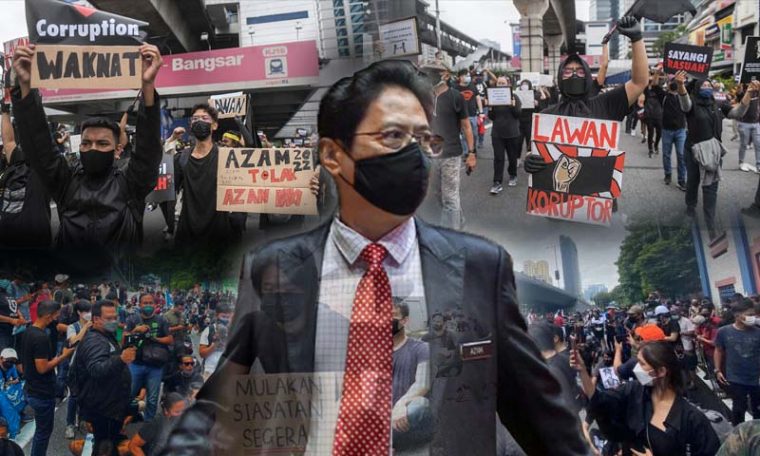
At this point, your guess is as good as ours, honestly.
Unfortunately, Malaysia has a deep and troublesome history when it comes to corruption. Over the years, we’ve gone through countless anti-corruption campaigns. Our government has poured who-knows how much money into new programmes and initiatives to encourage people to speak up against this problem.
Yet, when the very head of our anti-corruption agency can behave in such a manner, it can be very hard to take their words seriously. We are not children, content to listen to everything they say while turning a blind eye to everything they do.
In the end, if we ever want Malaysia to actually become a developed nation rather than a Third World country carrying a Gucci belt, we need to establish a culture of discipline and integrity rather than one of casual corruption and “not my problem”.
Learn more about Malaysia’s culture of corruption by checking out:
Why Are Malaysians So Tidak Apa About Corruption?



